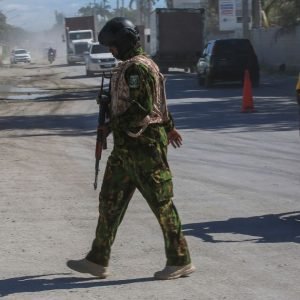
The world has changed considerably since then. Instead of a system of fixed exchange rates among major currencies, we now have a mixed system with major floating currency areas but fixed rates among smaller countries. At that time, we had capital controls, and now we are a global financial market. And from a small group of 44 countries that became the founding members of the International Monetary Fund (IMF) and World Bank, we now have membership that has expanded to [almost] all countries in the world.
Indeed, with all the complexities and uncertainties that the existing international monetary system presents, Bretton Woods seems to evoke a more orderly and cohesive world, raising the question of whether the international community should not strive towards a new Bretton Woods.
The big challenge 30 years ago was really how to integrate new countries in the global economy, including China and the big emerging markets. And we had over 30 years of what we call globalisation, with open financial markets and, of course, many financial crises.
So when I say reinventing Bretton Woods, I believe in the spirit of international cooperation. We need to preserve it, and double down on it at a time when the global economy is becoming more fragmented, more polarised, where discussion is all about confrontation and less about cooperation.
So yes, we need to reinvent Bretton Woods, because we are moving towards less multilateralism, and we are facing many new challenges from climate, migration, the rise of the digital economy, AI and digital money.
The landscape has changed dramatically since 1994. China has become the world’s second-largest economy, and the 2008 financial crisis and the coronavirus pandemic hit the global economy hard. What are the major challenges now, and how should we address them? How can China help?
If you look even at the last five years, from Covid-19 to now, think about the discussions we had. A couple of years ago, we were all talking about secular stagnation. Now we’re talking about inflation.
We were talking about unconventional monetary policy in many advanced countries. And today we’re concerned about quantitative tightening by central banks. We were talking five years ago about globalisation, remember? Now what are the keywords? They are derisking and decoupling. We were saying five years ago that the [US] dollar was still the main currency, there was dollar dominance. Now we are discussing de-dollarisation. So the risks are very different over five years.
Let’s face it, China is now one of the major players in terms of economic weight. And China has a huge influence in the global financial cycle. China needs to be and has been a responsible stakeholder in the global economy.
Today, I believe that China has, maybe, more responsibilities, not only as a driving force for growth, but also dealing with debt crises in many distressed countries. China needs to have influence, and that needs to be recognised among Bretton Woods institutions, because China’s current economic weight isn’t reflected in the way decisions are being made, particularly in terms of quotas and shares. Unequal voting power will continue to be a source of discontent, posing a threat to the legitimacy of the IMF.
I understand the Chinese authorities have been calling for many years for a new governance system. But China has also been responsible, in the sense that it didn’t decide to move away from the IMF, or from the World Bank. So it is still an important contributor to these two institutions.
We are celebrating the 80th anniversary of the Bretton Woods conference, so this is about the machinery of international cooperation. I think China, the United States and the European Union are the key stakeholders, but we also need to take into account the Global South. It’s about bringing these institutions to a new world where we know the challenges, understanding China is not going to serve as a passive stakeholder, but as one of the major agents for influence and change.
So [there are] new challenges, new players, but this is the way we need to cooperate, and institutions need to adapt to this new reality.
Yes, absolutely, I totally agree. So Bretton Woods is really at a crossroads. I believe that the concern – and the criticism – from Chinese authorities is they are one of the major economic powers today and the share and quota are not reflecting it. This is clear.
The question now is how we can make this happen, and how can we change the global governance framework? I think China, as a major beneficiary of globalisation and these global financial institutions, from the World Bank to the IMF, has an interest in preserving this international financial system.
We need to have a timely quota adjustment. This is crucial for IMF governance and its legitimacy. China should be part of these global efforts for this new Bretton Woods in the new world. It will take time, but China is very patient.
There are a lot of initiatives under way for many countries. I think this is a moment to prepare a plan. We are a world that is being contested. It’s very difficult in a world where economic cooperation is protested, where it’s becoming more difficult to negotiate, and where it is more difficult to agree for the sake of global public goods.
We all need to strive to make it happen. And it’s not just about China. It’s also about the concerns of many countries from what we now call the Global South, who have felt that these institutions are not legitimate because the decision-making power needs to be adapted.
In the global economy and in global governance, we need to preserve cooperation. We need to include, maybe, the rise of regional financing arrangements that have been created over the last few years, for example the Chiang Mai Initiative and European Stability Mechanism.
We might need to have the flourishing of not only one reserve currency, but multiple reserve currencies
At the same time, we need to think about how we interact between regional arrangements. If the world is moving towards regional blocs, for example, how can we circumvent concern about China-US relations and how can we reduce the tension? Because the survival of these institutions and global public goods is at stake.
So to summarise, I understand the concern and, of course, the frustration of many Chinese officials. I believe that China should drive a global effort for reform, and the 80th anniversary is a great moment to try to drive the changes needed.
Let’s not be naive, you know. Geopolitical forces are at work here since Russia’s invasion of Ukraine. China, as a super large economy, has long expressed its wish to internationalise the renminbi. This has already materialised in trade and could accelerate in the next few years. As a result, we are going to witness a reconfiguration of international trade and financial balances and potentially the balance of power between currencies.
China has positioned itself as a key point in supply chains and has a very dominant share in certain products. Indeed, the use of the Chinese currency is on the rise. However, the RMB share is really small, even in the medium term. So this internationalisation is still limited due to the fact that we have limited convertibility.
Remember, [Brazilian President Luiz Inacio Lula da Silva] expressed a wish to de-dollarise [Latin American] economies and create a common currency. Is it utopian? European countries have created one. I know better than anyone how long it will take to give birth to a single currency.
But it resonates very well in political terms. We have different forces at work here. First, the supply of safe, global, dollar-denominated assets depends on the US’ fiscal capacity. Demand for these assets is going to grow. Despite US dollar reserves eroding from 65 per cent [of global foreign reserve holdings] in 2016 to 58 per cent around 2022, the weight of the dollar is still very strong.
But now we have something new in the global economy. We call it the weaponisation of the dollar. This is not a minor issue, given the decoupling tendency, the tensions between the US and China that have been aggravated by the Russian invasion of Ukraine. So the weaponisation of currencies is going to be a game-changer.
A lot of concerns have been raised in China about the possibility the US could also employ arbitrary financial sanctions. It sends a signal to many countries who have been building [US dollar] reserves. Look at all the emerging markets in Asia. They have been building reserves for the past two decades because they wanted to have a source of resilience in case of any financial crisis.
We need to start building a world that is more multipolar. This is a new reality of the world, which is becoming much more complex.
We need to diversify the international monetary system. We might need to have the flourishing of not only one reserve currency, but multiple reserve currencies.
I think that internationalisation will take time. And I believe that among Chinese authorities, the priority at this moment is really to drive the growth model to a new dimension, from quantitative growth to qualitative growth, and also to take into account that the world will be less driven by globalisation or trade relations.
So I see RMB internationalisation as a medium-term objective that is not going to happen overnight, and there is still the problem of convertibility.
Secondly, this is going to be done based on domestic priorities before thinking about international priorities. But you have another value, which I believe is going to be quite attractive. It’s the rise of central bank digital currencies (CBDCs).
Different countries have adopted different approaches to the development of a central bank digital currency. China is quite far along in testing its digital yuan, while the US has shown a growing degree of scepticism towards a CBDC, which many conservative US politicians oppose. When CBDCs begin to be rolled out in other countries, that will likely add another dimension of fragmentation in the global payment landscape, as the lack of communicability and interoperability among different CBDCs will create serious challenges for the global payment system and financial stability.
I believe the world needs multiple reserve currencies. We don’t need to rely on one currency and one ecosystem because the global economy is different.
We’re clearly at a tipping point in the international financial system and in global governance.
So we need to think creatively about the new international institutions created a couple of years ago, like AIIB and the New Development Bank. We have new challenges, and these new challenges call for new institutions. We have all these institutions that need to be completely transformed to deal with the problems of our time. For example, climate change, which is the most important challenge that humanity is facing. And we need to think about it not only from the mission, but also as a system, putting goals together. The multilateral development banks need to try to work as a system because everyone has a stake in climate finance for climate mitigation and adaptation.
So I believe we need to look at it from a systemic point of view. We need to be ready to adapt the institutions for the 21st century. We need to say that we don’t want a world that is being contested, a world that is more fragmented.
We need to get back to cooperation. We need to try to make the planet safer, and the global economy more stable, sustainable and inclusive.
So I think there is space for AIIB, there is space for the New Development Bank. All of this machinery can be orchestrated. So, in order for the symphony to be played well, we need to do the same for global governance and for the global financial system.
You can draw up a list of the many problems that we face. And I think No 1 for all these institutions is to think about what are going to be the drivers of global growth. I think global growth that is green, sustainable and inclusive is priority one. When we know where growth drivers will be coming from, we can try to develop a narrative to create the right institutions, to transform these international institutions for the challenges we face.
There is an opportunity at this moment, even as geopolitics becomes more challenging.
I’m a believer. Remember, Bretton Woods was not done overnight. It took two years of negotiations. We need a workable plan. We need to bring back the feeling that there are global efforts because there are important challenges that we face. And I can see we can build a bigger, broader multilateral development bank, a better IMF that will reflect China’s influence in the global economy. And China can also be a source of proposals. So I’m not too pessimistic, despite all the current tension we face.
This is an important global public good that needs to be preserved, because if not these institutions will not have any role for the next decade.
After growing by more than 7 per cent a year for the past two decades, China is facing new realities. You are no longer in a global environment that is all about globalisation, free trade and global connectedness.
China reached a plateau in terms of investment in real estate. China needs to realise that it needs new drivers of growth. A big priority is to move from external demand to domestic demand. At the same time, investment is not going to be driven by real estate any more, and it needs to go to a new part of the domestic economy, like innovation.
China is leading the world in green energy, so China has a lot of capacity to grow. That is not going to be about growth for growth’s sake, not about quantitative growth, but about the quality of growth. China is also leading in new industries, from AI to the digital economy.
China is also at a turning point. That reality is well-recognised among Chinese economists. The question is, can China anticipate these new domestic challenges? Because it will need effective structural reform. You are doing it for your own stake. You are not doing it for the rest of the world. China, I think, knows this.
Maybe it will take a little time, because of concerns about low growth, the impact of local debts and the shadow banking system. All of these can trigger a financial crisis. So we need to make sure that we have the early warning system to detect any vulnerability in the financial system in China, particularly in the shadow banking system.
If you look at the state of the global economy today, we are seeing deglobalisation and a fragmented international order. All of this has created major uncertainty in trade negotiations, which are becoming more politicised. Of course, the economic and political interests of WTO members are diverging more, and it’s becoming more difficult to find willingness to agree on any compromise.
So what is the next paradigm? What is going to be the driving concept for the global economy moving forward? I believe that globalisation is not over. We are going to have a different form of globalisation. I believe that we are going to have a globalisation where, for example, China will do more trade with Asian countries and less trade with the US, or where European countries are going to do more trade within the EU. I think it’s going to be a type of reshuffling. So yes, the paradigm is not going to be globalisation as we’ve known it for the past 30 years.
If we move towards a different form of globalisation, it needs to be inclusive and sustainable, and it doesn’t need to be about confrontation. So let’s think about what the world will look like in the next 10 years.
We need to build up a world that’s more multipolar, and figure out the new multipolar rules that we need to work with
I am a believer. Despite the tensions we are facing today, I believe that the world might become more rational, that you are going to have more globalisation and more intensification of trade relations between China and Asia, and it is going to be the same in Europe. It is going to be the same in the US. Who is going to be the winner? It’s Mexico, because it’s all about geography of trade, and it’s very close to the US.
Look at the global map, and you will see a different geography of trade. It doesn’t mean that the world is de-globalising. Maybe we are going to have a world with regional blocs. You’ll have different blocs trading more among themselves.
So we need to build up a world that’s more multipolar, and figure out the new multipolar rules that we need to work with. But at the same time, the blocs need to talk to each other. You know, we need to set up new rules of the game for interactions.
So let’s be a little more optimistic. Let’s use the spirit that we had 80 years ago. The first mission of Bretton Woods was to review trade. Trade was the main driver. We need to fight fragmentation. We need to make sure that we keep that spirit despite divergent points of view and the difficulty of coming up with a compromise.






